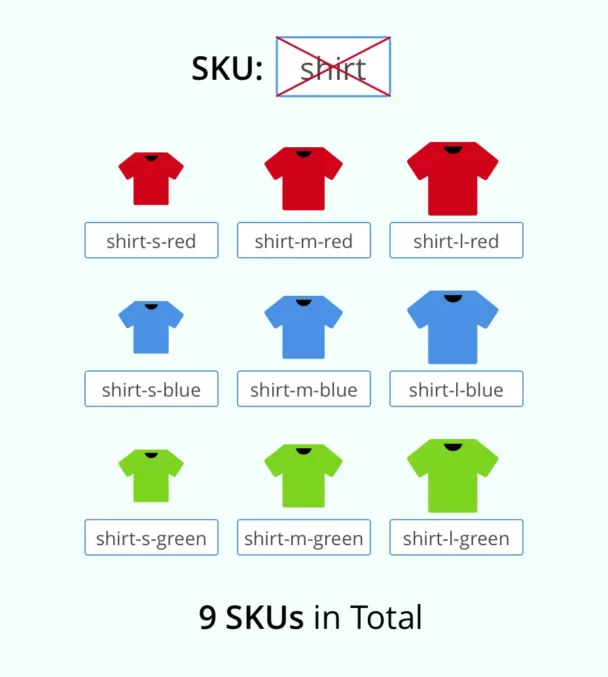
Introduction
Effective inventory management is absolutely essential in the world of retail and e-commerce. It plays a vital role in ensuring smooth operations and keeping customers satisfied. At the core of this process lies an important tool: the Stock Keeping Unit, widely recognised as SKU. This blog post will explore the concept of an SKU, how important it is for sellers, and how it's vital in business operations and inventory management.
"Inventory is MONEY sitting around in another form." - Rhonda Adams, USA Today
What is SKU?
An SKU, or Stock Keeping Unit, is a unique alphanumeric identification provided to each product for sale that identifies it from other items in the inventory based on variables such as category, size, colour, brand, and other features.
For example, a red medium-sized t-shirt from Brand X may be labelled with the SKU X-TSHIRT-RED-M.

Retailers use SKUs to track products, manage stockroom search operations, organise products, and categorise items based on price, colour, and size. Whether you run an ecommerce website or a physical store, assigning SKU numbers to products improves order fulfilment efficiency, regardless of inventory quantity.
The Importance of SKUs in Today's Business Landscape
SKUs are essential in many industries and businesses where effective inventory management and product differentiation are key. Here are the main areas where SKUs are commonly used nowadays:
- Retail
- E-commerce (Online retailers & Marketplaces)
- Wholesale and Distribution
- Manufacturing
- Logistics and Warehousing
- Automotive Industry
- Food and Beverage Industry

SKUs are essential in any business dealing with physical products. They offer an organised approach to inventory management, improving operational efficiency, and increasing customer satisfaction across a wide range of sectors. Whether in retail, manufacturing, shipping, healthcare, or other industries, SKUs ensure that organisations can successfully manage their inventory and meet the needs of their customers.
Why are SKUs Important for Sellers?
Efficient Inventory Management
SKUs allow sellers to accurately track their inventory. Businesses that provide a unique code to each product can quickly monitor stock levels, manage reorders, and avoid overstocking or stockouts. This accurate inventory control guarantees that the correct products are available at the right time, hence increasing overall operational efficiency.
Streamlined Sales Process
A well-organised SKU system enables for a more efficient sales procedure. When a customer puts an order, the SKU system assists in swiftly discovering the correct product in the inventory. This not only speeds up the order fulfilment process, but also decreases errors, resulting in higher customer satisfaction.
Data-Driven Decision Making
SKUs give useful data for making business decisions. By analysing SKU-level data, sellers can spot trends, learn about customer preferences, and make informed decisions about product supply, discontinuation, and promotions. This data-driven method aids in inventory optimisation and sales strategy enhancement.
Enhanced Customer Service
Sellers who use an advanced SKU system can give better customer service. For example, if a buyer inquires about the availability of a particular product, the seller can instantly search the SKU database and provide precise information. This timeliness improves the customer experience and fosters trust in the brand.
SKUs and Its Benefits to Business Operations
Inventory Optimization
SKUs can help businesses optimise their inventories. Businesses can modify inventory levels based on which SKUs sell the fastest. This guarantees that high-demand products are constantly available, while slow-moving commodities are controlled to avoid unnecessary inventory expenses.
Improved Supply Chain Management
SKUs play an important role in supply chain management. They enable precise order processing, efficient warehousing, and optimised logistics. Businesses that maintain organised SKU records can assure prompt replenishment, reduce lead times, and improve overall supply chain efficiency.
Financial Accuracy
Accurate SKU monitoring improves financial accuracy. Businesses that carefully manage inventory levels can keep accurate financial records, which are required for budgeting, forecasting, and financial reporting. This accuracy is critical for making informed financial decisions and remaining profitable.
Better Marketing Strategies
SKUs help to develop stronger marketing strategies. Businesses can use SKU data to determine which goods are popular and which are underperforming. This insight enables customised marketing campaigns, promotional events, and strategic product placements that increase sales and customer engagement.
SKU Mapping with Sellercraft

Improving Inventory Accuracy and Marketplace Synchronisation
In addition to knowing the significance and benefits of SKUs in inventory management, using innovative technologies and services can help you improve your business operations. For example, Sellercraft's "SKUs Mapping" service is one such useful tool.
What is SKUs Mapping?
SKUs Mapping is a specialised service offered by Sellercraft that assists sellers in keeping accurate inventory records and synchronising their inventory across multiple marketplaces. This ensures product availability and stock levels remain consistent across all sales platforms is essential.
How SKUs Mapping Benefits Sellers
Centralized Inventory Management
SKU mapping empowers businesses to manage their whole inventory through a single platform. Sellers who centralise inventory data may easily maintain stock levels, analyse sales, and manage reorders without having to browse various platforms.
Marketplace Synchronization
SKUs Mapping automatically updates stock levels across all connected marketplaces to Sellercraft, whenever inventory is modified. This real-time synchronisation reduces the possibility of overselling or stockouts, ensuring that customers receive correct information regarding product availability.
Improved Accuracy and Efficiency
Sellercraft's service minimises inventory record mistakes by mapping SKUs to specific products across several sales channels. This proper data management increases operational efficiency, resulting in a smoother sales process and improved customer loyalty.
Enhanced Analytical Insights
SKU mapping delivers useful data insights by analysing sales and inventory trends across many platforms. Sellers can take advantage of this data to make smarter decisions about stock management, marketing strategies, and general operations
Best Practices to Follow in Creating SKU for Better SKU Mapping
Creating effective SKUs (Stock Keeping Units) is critical for efficient inventory management and seamless business operations. Here are some basic practices to consider while developing SKUs:
Keep It Simple, Unique and Consistent
In order to prevent confusion, employ a simple, consistent format for all SKUs, making sure the structure is logical, unique, and easy to understand for anyone who might need to use it. Additionally, keep SKUs to a reasonable length, usually no more than 10-15 characters, to make them manageable and easy to read.
Make it Informative
To categorize your products effectively, start with broad categories and narrow down to specific details, incorporating descriptors such as category, brand, size, color, and other unique characteristics. For instance, a red medium-sized t-shirt from Brand X could be labeled as "X-TSHIRT-RED-M." Utilizing a tool like the ZOHO Free SKU Generator can streamline this process by automatically generating SKUs.
Avoid Special Characters
Refrain from using special characters or spaces in your SKUs. Stick to alphanumeric letters, hyphens, and underscores. Special characters can occasionally cause problems in databases or during integration with other systems.
Plan for Scalability
Ensure that your SKU structure can support additional products without major modifications. Allow room for additional products and new categories. For example, if you intend to broaden your product line, avoid hard-coding product kinds.
Document Your System
Clearly outline your SKU creation procedure and guidelines. This provides consistency even when several people create SKUs. Provide training and reference resources for employees to use.
Regularly Review and Audit
Review your SKU system on a regular basis for irregularities or areas for improvement. Perform regular reviews to ensure that all SKUs are used correctly and consistently.
Conclusion
Ultimately, SKUs play a crucial role in ensuring efficient inventory management within the retail and e-commerce sectors. With the use of unique IDs for each product, businesses can optimise their operations, improve customer satisfaction, and make informed decisions based on data. SKUs offer a wide range of benefits that span across different sectors. They enable efficient inventory tracking, optimise supply chain management, and ensure accurate financial reporting.
By implementing best practices in SKU creation and using tools such as Sellercraft's SKU Mapping service, operational efficiency and marketplace synchronisation can be significantly improved.
Businesses that use a properly structured SKU system can maintain correct inventory records, quickly meet customer demands, and ultimately prosper in a competitive market.


